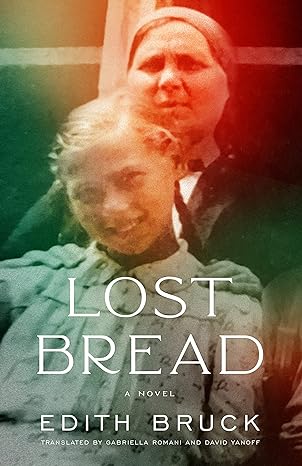On the occasion of the International Holocaust Remembrance Day
The Italian Cultural Institute in New York is pleased to invite you to the book presentation of
“Lost Bread” by Edith Bruck
traslated by: Gabriella Romani and David Yanoff
Professor of Italian at Seton Hall University, Gabriella Romani, will be in conversation with ICI – NY director, Fabio Finotti.
Lost bread – Drawing on the remarkable events of her own life, renowned author and Holocaust survivor Edith Bruck tells the story of Ditke, a young Jewish girl living in Hungary during World War II.
In 1944, twelve-year-old Ditke, her parents, and her siblings are forced out of their home by the Nazis and sent to a series of concentration camps, including Auschwitz and Dachau. Miraculously surviving the war with one of her sisters, but losing her parents and a brother, Ditke begins a tortuous journey—first back to Hungary, where she knows she doesn’t belong, and then to Israel. There, she holds various jobs before she leaves with a dance troupe, touring Turkey, Switzerland, and Italy. In Italy she finds a home, at last, and a small measure of peace; there, too, she falls in love and marries.
Writing as herself, Edith Bruck closes Lost Bread by addressing a letter to God expressing her rejection of hatred, her love for life, and her hope never to lose her memory or ability to continue speaking for those who perished in the Nazi concentration camps. After the book’s publication in Italy, Pope Francis visited Bruck and thanked her for bearing witness to the atrocities of the Holocaust.
The Italian original, Il pane perduto (2021), won the Strega Prize, the most prestigious Italian literary award in 2021.
*
About the Author – Edith Bruck (born 3 May 1931) is a Hungarian-born writer, director and Holocaust survivor. She has lived most of her life in Italy and writes in Italian.
The daughter of poor Jewish parents, she was born Edit Steinschreiber in the village of Tiszabercel near the Ukrainian border. In 1944, with her parents, two brothers and a sister, she was sent to Auschwitz, where her mother died. The family was transferred to Dachau where her father died, then to Christianstadt and finally Bergen-Belsen, where the remaining children were liberated by the Allies in 1945. One brother also died in the concentration camps. She returned to Hungary and then went to Czechoslovakia, where another sister was living with her family.
In 1959, she published her autobiography Chi ti ama così, later translated as Who loves you like this (2001)
In 1971, she wrote her first play, Sulla porta. Bruck was a founder of the Teatro della Maddalena theatre in Rome. From the 1970s to the 1990s, she worked for the RAI as a director and screenwriter. She has translated works by the Hungarian poets Attila József and Miklós Radnóti into Italian. Her own work has been translated into other languages including Hungarian, Danish, Dutch, English and German.
Reservation no longer available




